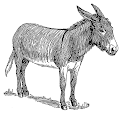Stylus Magazine is ending its five year run of media critique, interviews, pop culture reflections and clever list-making. I'll miss the site for its candor and the sympathetically British perspective on independent music. Best of luck to the writers and editors, I'm sure I'll be reading you somewhere else soon.
NEWS: Farewell to Stylus
Stylus Magazine is ending its five year run of media critique, interviews, pop culture reflections and clever list-making. I'll miss the site for its candor and the sympathetically British perspective on independent music. Best of luck to the writers and editors, I'm sure I'll be reading you somewhere else soon.
REVIEW: Interpol "Our Love to Admire"
Rating: 3.5
Wire to wire gloom and flat dynamic shifts render a once admirably intense unit predictable and dull. Echoing guitars no longer stir with the same electricity, drumming moves from insistent to incessant and vocals fail to register an actual emotion, hanging hopes instead on a lingering sense of ennui now dead from long term exposure to matter-of-fact-ness. Not with a bang but a whimper goes this stadium sized incarnation of smart and sexy New York emo-gloom.
REVIEW: The National "Boxer"
Writer Pierce Egan first referred to boxing as the "sweet science of bruising" in his 1824 publication "Boxiana" [originally a serial publication called "Sketches of Ancient and Modern Pugilism (1813-1828)," a perfectly 19th century title if e're there was]. Another writer, A.J. Liebling, popularized an abbreviated form of the phrase in the 1950's with "The Sweet Science," a collection of boxing pieces written for The New Yorker. “A boxer, like a writer, must stand alone,” said Liebling,* succinctly framing what has become a great American metaphor - the artist as boxer; a lone fighter who must use his talent, strength, wits and will to stand his ground. And win or lose, he is going to take a beating.
Entering the ring with their second album on Beggars Banquet, The National. Boxer is a bruised and beautiful love letter to the "unmagnificent lives of adults," (track 2 Mistaken for Strangers) and it goes the distance.
The metaphor fits on a couple of levels. Topically: Each round in a boxing match lasts 3 minutes and title matches are scheduled for 12 - 15 rounds. An average pop song lasts about 3 minutes (Boxer averages 3:42), and there are 12 songs on the album. More importantly, the band moves like a boxer. Circling, staggering, lilting, leaning, repeating flourishes and lines when they stick, rocking on the balls of their feet until, punched out, they can only find their heels.
Boxer further distills Alligator's subtle use of simple, heart felt melodies allowing the band to emphasize its well established sense of mood, pulse, and motion. They play with an ease learned through years of practice, not surprising since the band is comprised of two sets of brothers, Aaron & Bryce Dessner and Scott & Bryan Devendorf plus singer Matt Berninger, all childhood friends from Cincinnati, as well as string contributor Padma Newsome. Tension builds within passages through contrasting rather than competing play - moving like fighters in a ring - together, alone.
Each instrument also seems to consciously embody a specific part of the fighter. Drums pound resolutely becoming a boxer's unfaltering will to fight, driving on even as other elements of a song bleed and stumble. Piano stands in for stamina, at times rhythmically bolstering the will, other times dragging its feet, gently blurring the melody. Guitars and strings reach, parry, bob and weave providing a map of the fighter's movements on the mat and a consistent energy, even when he's against the ropes. Finally it's Berninger's combined writing and vocal performance that takes center ring, creating a rich paradox of strength and defeat. His well dressed lyrics are unbuttoned but not untucked by an end-of-the-evening delivery. Berninger's deadpanned baritone, never wandering above middle C, belies a great mass whose gravitas is buoyed by alternately romantic and mundane images of life's everyday struggles. From track 5 to track 6 (Green Gloves to Slow Show) he moves from proclaiming himself "the best slow dancer in the universe" to being the very definition of awkward, feeling "a little more stupid, a little more scared, every second more unprepared." This is the guy weaving away from the party without the girl, still carrying a glass of ice cubes.
The album is able to reconcile, even at times relish the way life can simultaneously offer beauty and a beating while in the end leaving you wanting another shot. Egan's original quote calling boxing the "sweet science of bruising" ingeniously fails to specify whether the word bruising refers to the act of creating a bruise on one's opponent or that of sustaining a bruise on one's self. Dropping the simple prepositional "of bruising" to dub boxing The Sweet Science strips the concept of its most important truth, trading away its visceral poetry in favor of abstract praise. The National returns this missing, ambiguous poetry to the phrase. After 12 rounds even if you've won you've been beaten. And if you've been beaten but leave the ring wanting another shot then what of importance have you really lost?
* paraphrased from Jon Christiansen's "The Sweet Science of Stories" featured on Great Basin News.
Subscribe to:
Comments (Atom)



